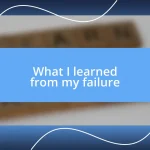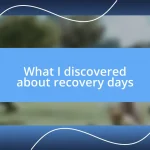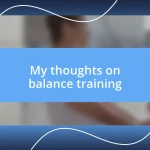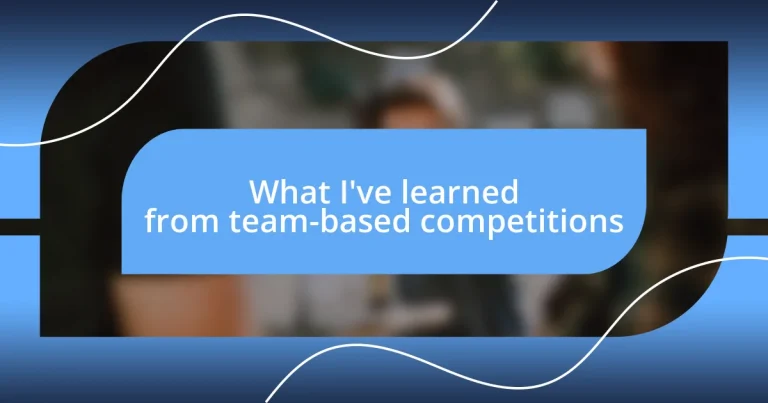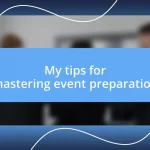Key takeaways:
- Effective communication and active listening are essential for fostering teamwork and overcoming challenges, as they create a supportive and inclusive environment.
- Leveraging individual strengths and setting common goals enhances team cohesion and boosts overall performance, making every member feel valued and accountable.
- Reflecting on team experiences and giving constructive feedback strengthens relationships and promotes personal growth, creating lasting bonds beyond the competition.
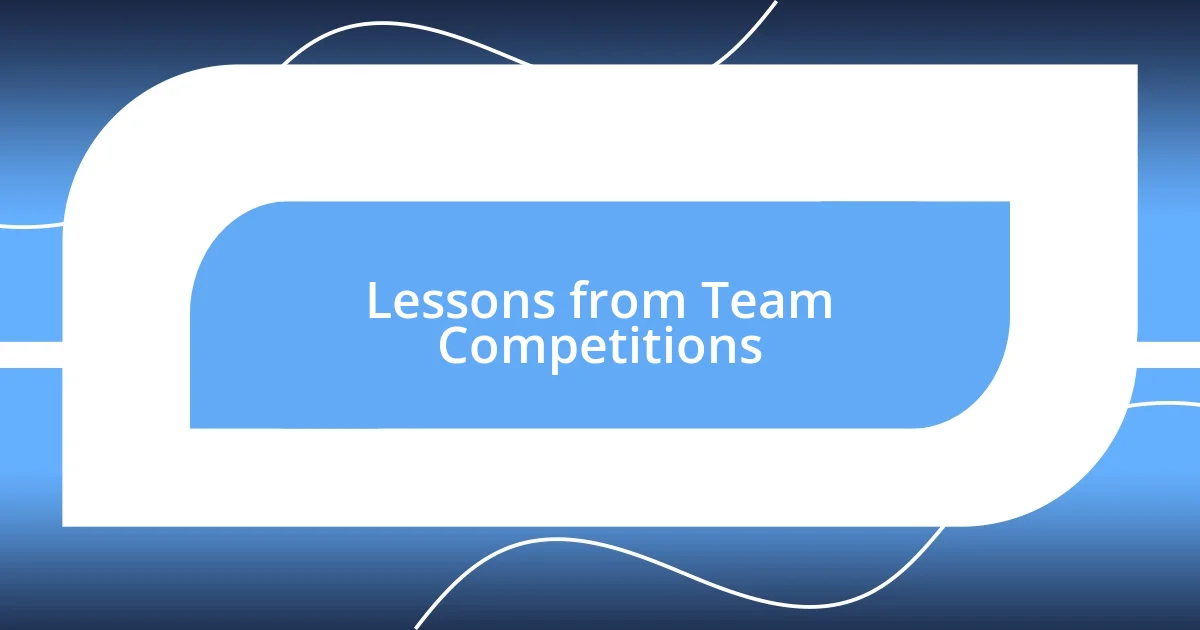
Lessons from Team Competitions
Team competitions have taught me invaluable lessons about the importance of communication. I remember a time when our team lacked clear communication during a crucial challenge, and it impacted our performance significantly. Reflecting on that experience, it became clear to me—how well do you really know your teammates’ strengths and weaknesses?
I also learned that embracing diversity within a team can lead to powerful outcomes. During one competition, our varied backgrounds and perspectives sparked creative solutions to problems we faced. That experience opened my eyes to how diverse thinking can truly be a game changer, and it makes me wonder: have you ever worked with someone who brought a completely different approach to the table?
Lastly, the emotional resilience developed through team competitions is unparalleled. There were moments of intense pressure when it felt like everything was on the line, and those became the moments I bonded the most with my teammates. Isn’t it fascinating how shared struggles can forge deeper connections?
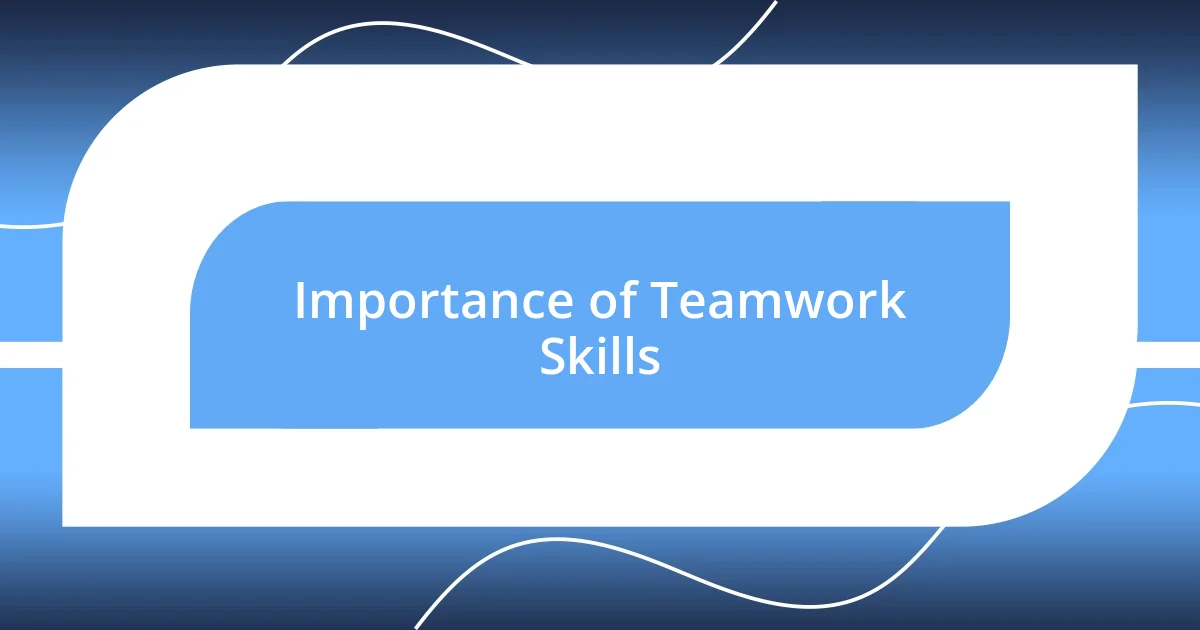
Importance of Teamwork Skills
The significance of teamwork skills cannot be overstated. I recall a particularly challenging event where my team was up against fierce competitors. We quickly realized that our ability to collaborate and support one another would determine our success. When one member faced a setback, it was our collective effort that rallied to uplift morale and strategize anew. Such experiences reinforced my belief that teamwork transcends individual talents; it’s about blending those talents into a cohesive effort.
Here are some crucial teamwork skills that I’ve found to be vital:
- Effective Communication: Keeping lines of dialogue open ensures everyone is on the same page.
- Active Listening: Understanding teammates’ ideas fosters a more inclusive atmosphere.
- Conflict Resolution: Navigating disagreements thoughtfully leads to stronger relationships.
- Adaptability: Being flexible helps the team pivot when circumstances change, enhancing resilience.
- Trust Building: I’m convinced that confidence in one another strengthens our collaborative spirit.
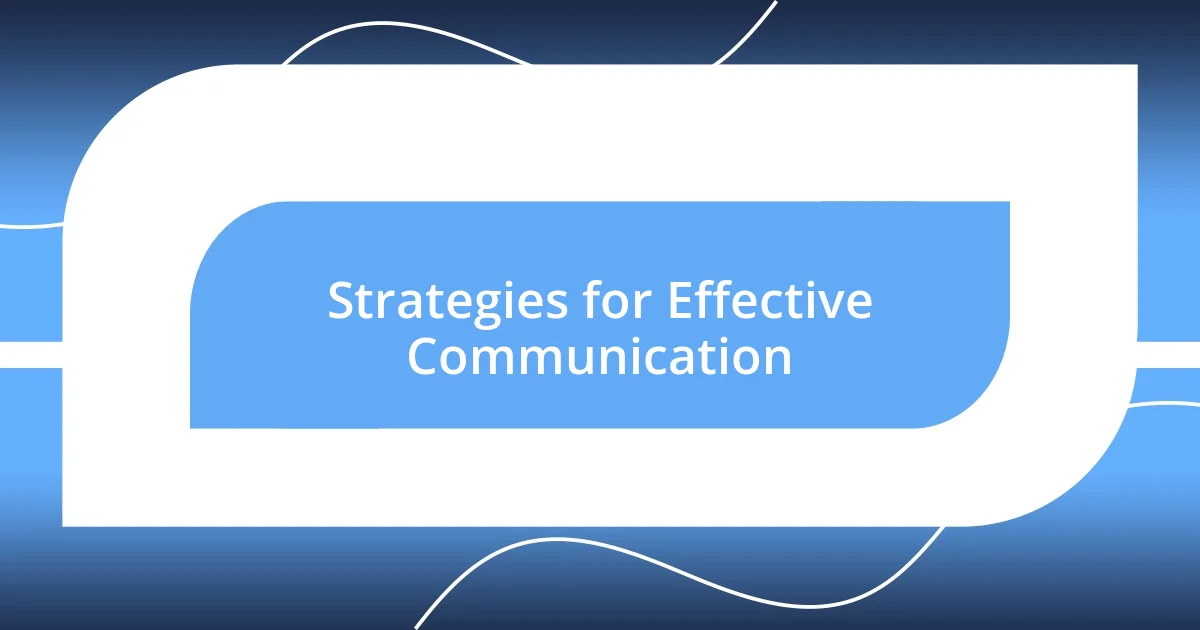
Strategies for Effective Communication
Effective communication is at the heart of successful teamwork. From my experience, establishing a routine for regular check-ins can work wonders. In one competition, we started having brief daily meetings to discuss our objectives and any concerns. This simple strategy transformed our collaboration, as we felt more aligned and informed, making us more agile when facing unexpected challenges.
Active listening plays a crucial role in fostering a positive team environment. I recall a time during a brainstorming session when one of my teammates shared an out-of-the-box idea that initially seemed too bold. Instead of dismissing it, we all committed to listening with an open mind, which led to discussing the idea further and implementing aspects of it successfully in our strategy. That taught me how vital it is to create a space where every idea feels valued.
Moreover, utilizing non-verbal cues can enhance communication significantly. I discovered this when our team relied on subtle hand signals to coordinate during a fast-paced challenge. This approach not only streamlined our communication but also cultivated a deeper understanding among us. I find it fascinating how a shared glance or nod can convey so much without uttering a word.
| Strategy | Description |
|---|---|
| Regular Check-ins | Daily meetings to align objectives and address concerns. |
| Active Listening | Valuing all ideas fosters inclusivity and innovation. |
| Non-Verbal Cues | Using gestures to enhance communication, especially in fast-paced scenarios. |
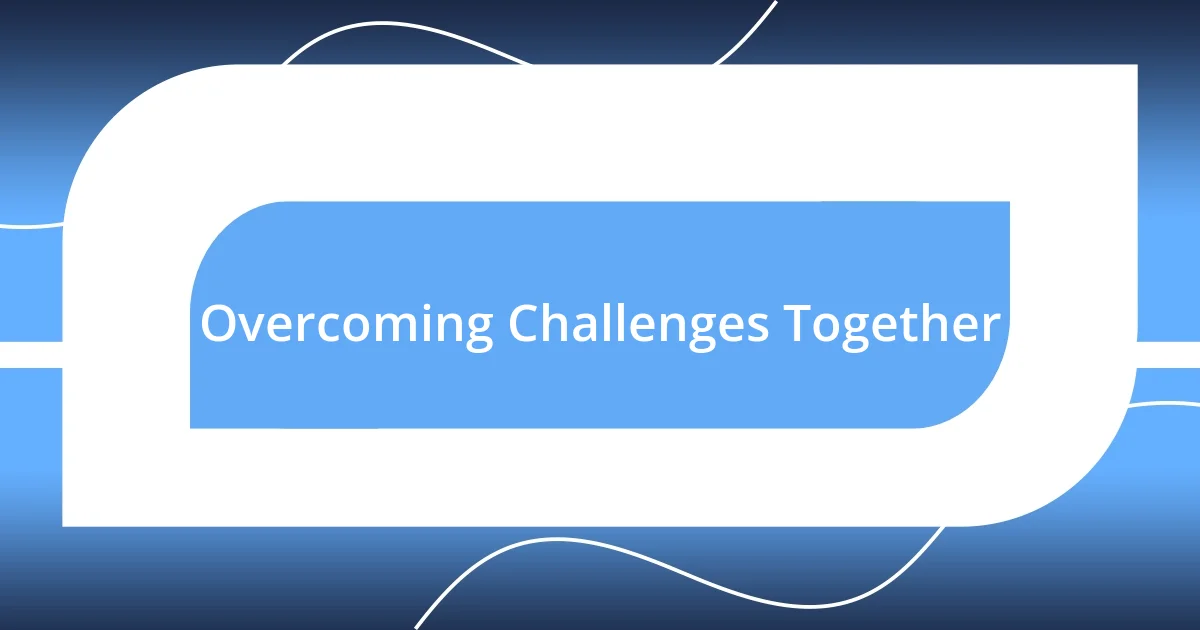
Overcoming Challenges Together
When facing challenges as a team, there’s an incredible camaraderie that develops. I remember a particularly tough competition where technical difficulties almost derailed our efforts. In that moment, rather than pointing fingers, we turned to each other, brainstorming solutions, and refusing to give up. It was this unity—not just our skills—that pulled us through. Have you ever felt that rush of teamwork when everything seems against you?
Navigating obstacles together can be a rollercoaster of emotions. I vividly recall our team during a high-pressure scenario where tensions were palpable. Some of us were anxious, and that anxiety spread, momentarily threatening our focus. Instead of succumbing to the stress, we took a step back, shared a few light-hearted moments, and recalibrated our collective mindset. That experience underscored my belief that humor and support are powerful tools when facing adversity. Isn’t it remarkable how a good laugh can bridge gaps and reset perspectives?
Collaboration in tough times not only strengthens bonds; it teaches invaluable lessons. I once experienced a moment during a disagreement about strategy that felt like a brick wall. Rather than letting it divide us, we chose to embrace the discomfort and discuss our differing views openly. Surprisingly, this led to a breakthrough idea that no one had anticipated. It’s astonishing how conflict, when tackled together, can morph into creativity and innovation. Wouldn’t you agree that overcoming such hurdles can redefine the way we work together?
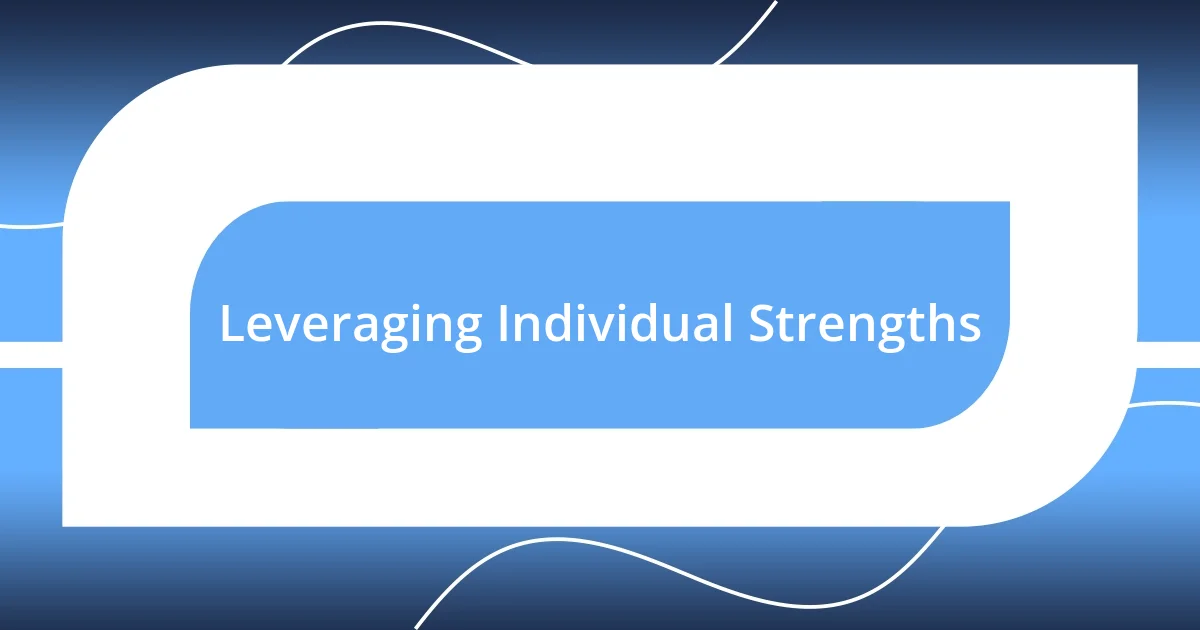
Leveraging Individual Strengths
Identifying and leveraging individual strengths is crucial in team-based competitions. I remember a situation where one team member excelled at data analysis while another had a knack for creative presentation. We made it a point to assign roles that played to those strengths, resulting in a well-rounded approach that amplified our performance. How often have you seen a project falter simply because strengths weren’t utilized effectively?
In one competition, we adopted a “strengths inventory” where each team member identified their top skills. This simple exercise revealed hidden talents, like one teammate’s exceptional negotiation skills, which we later tapped into during our pitch preparation. I found it enlightening how acknowledging each other’s strengths not only boosted our confidence but also increased our overall synergy. Doesn’t it feel empowering when you know exactly where you can contribute the most?
Moreover, I’ve learned that encouraging team members to take ownership of tasks that suit their strengths creates a sense of accountability. I once teamed up with someone who thrived in high-pressure situations. Instead of taking the lead, I stepped back during crunch time and let them steer the ship while I supported from the side. This experience made me realize that sometimes, trusting others to shine can lead to collective success that benefits everyone. Can you recall a moment where trusting a teammate transformed the outcome for the better?
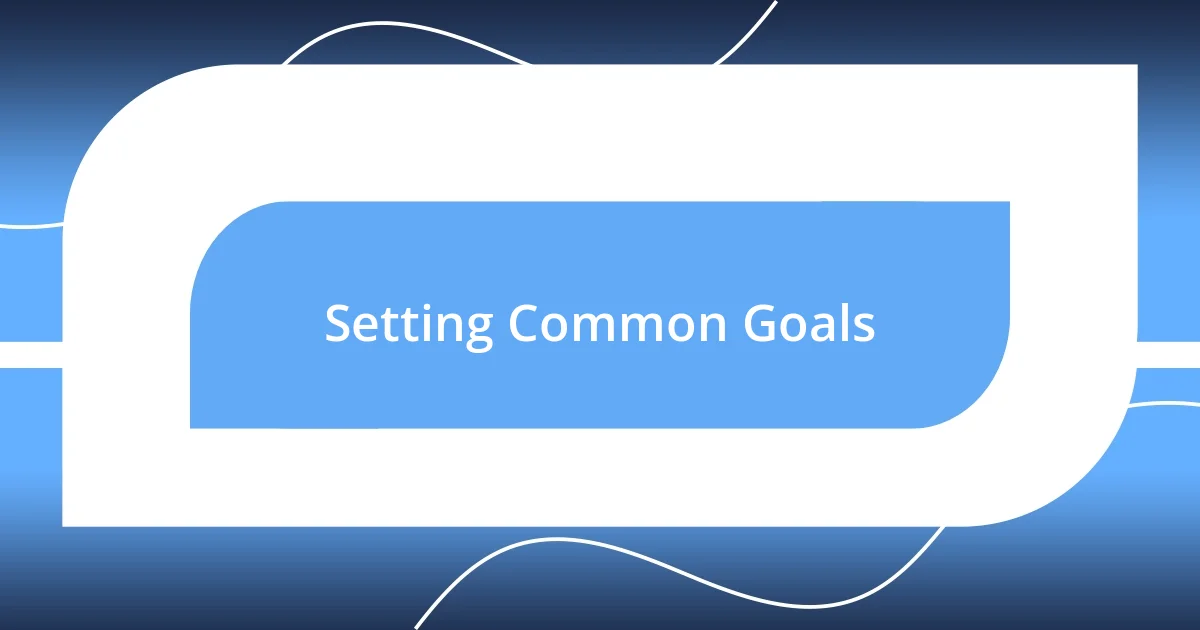
Setting Common Goals
Setting common goals is the backbone of any team-based competition. I recall a memorable instance where our team gathered for a brainstorming session, fueled by a mix of excitement and nerves. As we jotted down our aspirations, I noticed how each team member’s personal goals intertwined with our collective ambitions, creating a tapestry of motivation. When everyone’s voice is heard, the shared vision becomes more than just a target; it transforms into a rallying point that energizes the entire group. Have you ever felt that electrifying connection when everyone is aligned toward a common purpose?
During another competition, we faced the daunting task of setting specific targets. Instead of a generic win-at-all-costs mentality, we broke it down into achievable milestones—weekly tasks and individual contributions that contributed to our bigger picture. I remember how the process of defining these incremental objectives not only clarified our path but also fostered a sense of ownership among team members. When we celebrated small victories along the way, it reinforced our commitment to the overall goal. Isn’t it fascinating how the journey can be just as rewarding as the destination?
I’ve found that revisiting our goals regularly is essential to keep the momentum going. In one situation, we had a mid-point check-in where we evaluated our progress and recalibrated our strategy. It was eye-opening to realize that, while we had made significant strides, some goals needed adjustment based on changing circumstances. This adaptability kept our team united, reinforcing the idea that common goals aren’t rigid—they evolve as we grow. How have you seen flexibility in goal-setting create opportunities for teams to thrive?
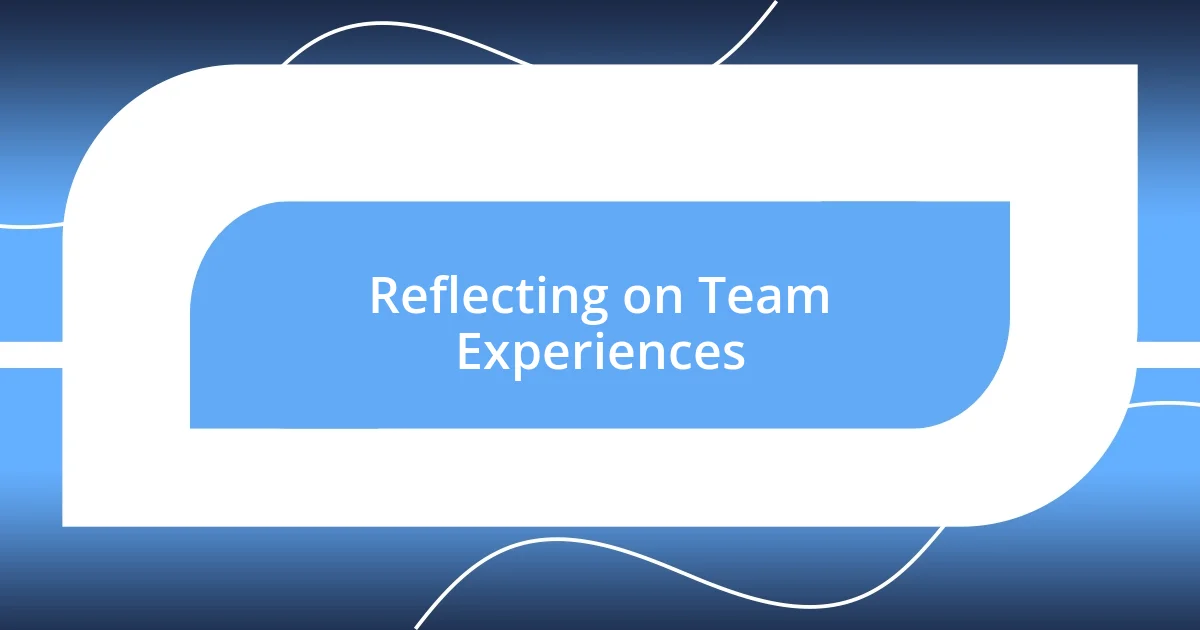
Reflecting on Team Experiences
Reflecting on team experiences often brings to light the unexpected lessons that shape us. I remember one competition where our chemistry was off; we struggled to find our rhythm. After a candid discussion about our dynamics, it became clear that some members felt unheard. That moment of vulnerability transformed our communication and allowed us to create an environment where everyone felt comfortable sharing their ideas. Have you ever experienced the power of open dialogue in a group?
One particularly tough project taught me the value of constructive feedback. Rather than critiquing one another harshly, we adopted a “sandwich method”—starting with something positive, addressing areas for improvement, and finishing with encouragement. I was surprised at how this approach not only made the conversations feel less intimidating but also strengthened our trust as teammates. Reflecting on that experience, I now understand that effective feedback is a form of support and growth. How has your team navigated the tricky waters of giving and receiving feedback?
In retrospect, I often think about the friendships formed through these competitions and how they have enriched my life. I cherish the late-night brainstorming sessions where laughter mingled with tension. Those moments not only deepened our collaboration but forged bonds that extend beyond competition. Looking back, I realize that the shared experiences—both the triumphs and challenges—are what truly linger in my memory. What moments do you find yourself reminiscing about with your teammates?


